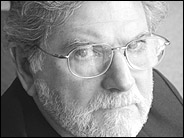Ventures in China
The cramped office has the musty smell of a used bookstore. Hundreds of yellowed tomes line the walls. Thirty-nine volumes of the collected writings of Lenin stretch across an entire shelf, and a black-and-white photo of Russia's "Man of the Century" himself is propped up on the facing wall. Political science professor Samuel Noumoff sits at his desk, staring intently at a computer screen.
 Political science professor Sam Noumoff
Political science professor Sam NoumoffPHOTO: Claudio Calligaris |
|
An internationally recognized authority on China, Noumoff was recently appointed Economic Development Adviser to Fuling and Jiulongpo, two Sichuan sub-cities concentrating on environmental technology.
Noumoff is developing a "venture capital" model intended to conform with the principles of China's socialist market economy. With Jean Chrétien's much publicized trade mission to China dominating recent newspaper headlines, it goes without saying that Noumoff has an idea or two about that country's entry into the global economy.
But right now he's having e-mail trouble. "I accidentally left my computer on last night," he says as he pushes the mouse around his cluttered desk.
Satisfied that his computer is functioning, he sits back in his chair and is ready to talk China. A portrait of Lu Xun, the executed writer-dissident (and personal fave of Chairman Mao), peers over his shoulder.
Noumoff traces his passion to seeing post-WWII photos of "a hundred men pulling a barge down a canal with their backs completely bent over." He saw his own values reflected in China's "major struggle for human betterment," and to this day remains a true believer in the great experiment that is China.
In the summer of 1971, he was part of the first Canadian delegation to enter China after the normalization of diplomatic relations. The next 30 years saw him make regular return visits, including seven cross-China lecture tours.
Noumoff is a proponent of China's quest to increase material wealth while maintaining equity. He explains his ongoing work by simply stating, "I'm doing this because I think it's the right thing to do, and I believe that the more rapidly China develops, the healthier the world will be."
China is facing unique challenges as it attempts to strike a balance between being a global player and developing an autonomous technology infrastructure. Noumoff warns of a Western agenda "to try to transform China as they did to the Soviet Union, -- essentially breaking it, bending it to their own will."
He is, however, quick to point out that the USSR's fate wasn't completely Western-driven, citing what he believes to be Mikhail Gorbachev's crucial error of placing political concerns before economic change.
It's a mistake the Chinese don't wish to repeat in their own drive "to rapidly increase the material foundation of the society, to both build it further as well as provide a greater degree of distribution of equity" without destroying their existing system.
Noumoff believes the Chinese recognize that a certain amount of "hemorrhaging" (not the least of which is an accentuation of economic divisions) is the price for their ultimate gain.
"They think they can maintain control," he notes, adding that the hemorrhaging and hostile international agendas come together to form "a very complex matrix. And the question is: What's the chemistry?"
Noumoff's venture capital model attempts to create good international trade chemistry. The model hinges on what he calls "a double bridge," and he's currently assembling teams of facilitators who will help smooth out misunderstandings on both ends of a trade negotiation.
On the North American side, Noumoff is working with an engineer at the Stanford Research Institute in California, who brings to the project expertise in early-stage technology development. In China, he's drawing upon a "very fine reservoir of people," including colleagues from the Academy of Science and various retirees from all levels of government and ministries. (China has a relatively early retirement age.)
Many of the Chinese players studied abroad bringing to the team invaluable insight into the workings of both Chinese and North American business mentalities. Noumoff says such perspective is crucial to the venture capital model, explaining that the number of misunderstandings on both sides of a Chinese-Canadian trade deal are "really quite extraordinary.
"There are enormous opportunities in China," he says, "but unless you have the right channel, it will sour. This bridge mechanism can provide an objective sense of what actually took place."
He recalls being enlisted recently to find a Canadian business willing to aid in a Chinese reforestation project, and coming up empty-handed.
Although he couldn't get a straight answer from those he approached, he suspects a combination of factors (including shyness and inexperience in economic dealings with China, accentuated by circulating "horror stories" about soured Chinese trade deals) led to this "shortsighted" behaviour.
On the extremely controversial topic of human rights -- see Tibet or Falun Gong -- Noumoff doesn't believe such issues should enter into Canada-China trade talks at this point in time. He suggests Canadians are not "in a position to lecture anyone on the morality of the inadequacies in a society," citing the abject poverty on many native reserves.
As for Falun Gong, he believes that truly sinister elements within the movement make the story far more complicated than much Western press coverage suggests.
Noumoff believes that a two-way relationship built on empathy and respect is crucial in order to build a long-term relationship between Canada and China.
"The Chinese have a lot of sayings," he adds, getting up from his chair and turning off the computer. "One of them is, 'You don't get engaged until you dance.' To develop a great relationship, you have to get to know them, and they have to get to know you."

